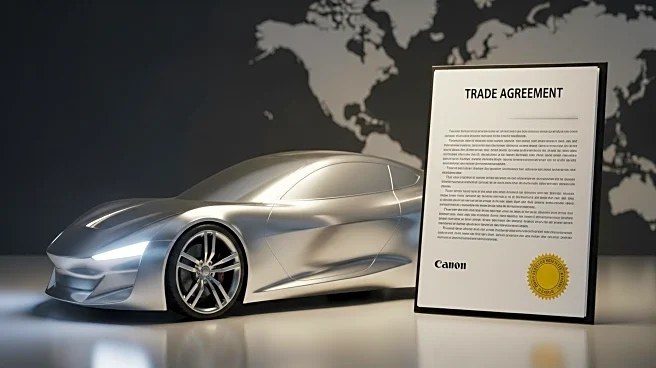What's Happening?
President Trump has announced a significant reduction in tariffs on Japanese cars, cutting them from 27.5% to 15%. This decision is part of a broader trade agreement with Japan that aims to open Japanese markets to U.S. agricultural products, including rice and farm goods. The deal also includes a commitment from Japan to invest $550 billion in U.S. projects and purchase at least $8 billion worth of American goods annually. The agreement follows months of negotiations after President Trump imposed sweeping tariffs globally, affecting allies and adversaries alike. Japanese automakers, such as Toyota, Honda, and Nissan, are expected to benefit from the reduced tariffs, which have already led to a rise in their stock prices.
Why It's Important?
The reduction in tariffs is crucial for both the U.S. and Japan, as it helps alleviate tensions caused by previous tariff impositions. For the U.S., the agreement is expected to reduce the trade deficit with Japan and provide American farmers with new market opportunities, potentially stabilizing rural economies affected by earlier trade disputes. For Japan, the deal offers relief to its auto industry, a vital part of its export economy, and helps avoid a potential trade war with its largest market. The agreement also reflects President Trump's strategy of using tariffs to negotiate bilateral trade deals, which has implications for global trade dynamics.
What's Next?
The success of the agreement will depend on Japan's ability to fulfill its commitments, particularly in increasing imports of U.S. agricultural products. There may be resistance from Japanese farmers and lobby groups, which could affect the implementation of the deal. Additionally, other countries may adjust their trade strategies in response to the U.S.'s aggressive tariff diplomacy, potentially leading to new negotiations or trade conflicts. The impact on U.S. consumers, in terms of prices and product availability, will also be closely monitored.
Beyond the Headlines
The trade agreement highlights the complexities of international trade negotiations and the potential risks of using tariffs as leverage. Critics argue that such tactics could destabilize the global trading system and lead to higher consumer prices. The deal also underscores the importance of balancing national interests with global economic stability, as countries navigate the challenges of trade diplomacy.









